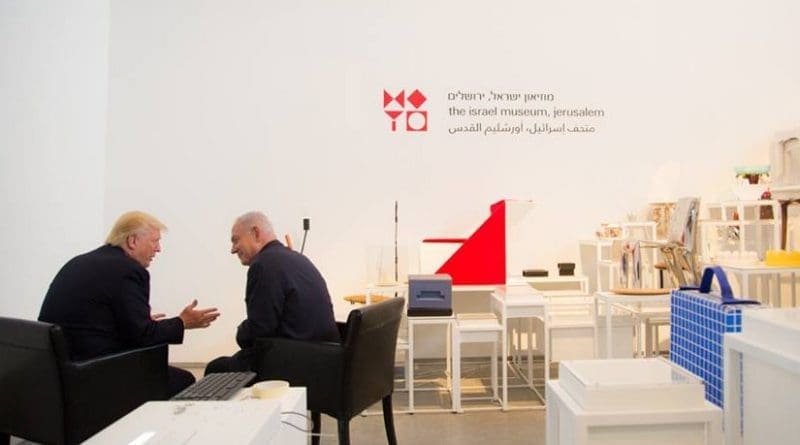How Fares Trump’s Peace Plan? – OpEd
In mid-October 2018 rumours about Trump’s long-awaited Middle East peace plan were flying around the Israeli media. On the 22nd one TV channel reported a conversation between Donald Trump and the French president, Emmanuel Macron, during which Trump had apparently said that he was prepared to “get tough” if necessary with the Israeli prime minister, Benjamin Netanyahu.
“I gave Bibi a lot,” Trump was reported to have said, referring not only to his decision to recognize Jerusalem as Israel’s capital and move the US embassy there, but also to the vast sums transferred annually to Israel by way of American aid.
Officlals and commentators were quick to draw obvious implications from these remarks – namely that the Trump peace plan embodied several elements that would probably prove distasteful to Netanyahu, and that they might require some painful concessions by Israel that could involve him in political difficulties at home. It seemed equally clear that, once the plan was unrolled and all its details revealed, Trump was likely to give no ground in demanding that Israel accept it in full, however distasteful certain aspects might be. He would expect this as part of the normal “give and take” of deal-making.
In fact these latest rumours were by no means new. Twice since the start of 2018 Trump has remarked that, in exchange for his actions on Jerusalem, Israel “would have to pay more” in any agreement with the Palestinians. The rollout of his peace plan which, according to media reports, could have taken place from about June 2018, has been awaiting a suitably propitious moment.
On the sidelines of the UN General Assembly in September Trump said that he intended to reveal the peace plan before the end of 2018. It is still not clear whether he intends to stick by that timetable.
Three main factors seemed to be holding up the rollout. There is PA President Mahmoud Abbas’s flat rejection of the plan in advance, and without knowing its contents, because of Trump’s recognition of Jerusalem as Israel’s capital and moving the US embassy there from Tel Aviv. Abbas reinforced this position by declaring that the US was no longer acceptable as a peace broker.
A second inhibitory factor has been the near-universal belief that the Saudi Crown Prince, Mohammad bin Salman (MBS), masterminded the murder of journalist Jamal Khashoggi in the Saudi embassy in Ankara. Saudi Arabia is the Arab state closest to America, and it was believed that the Trump peace team had been counting on widespread Arab endorsement, led by Saudi Arabia, to underpin the plan.
Finally, the US mid-term elections were looming, and Trump probably wanted them out of the way before making any move.
The elections on November 6, widely perceived as a popular vote on Trump’s administration, left him battered but unbowed. The House of Representatives regained a Democrat majority, but the Republican hold on the Senate was strengthened. With full Republican control of Congress no longer available, Trump will certainly find domestic legislation difficult to achieve in the next two years. He may well think it more congenial to turn his attention to foreign policy.
And indeed, on the day after the mid-terms, November 7, reports appeared in the media indicating that Jared Kushner was heavily engaged in preparing a detailed promotional campaign aimed at selling the peace plan to US political and public opinion, and to the world. The launch would, of course, be headed by Trump himself, but Kushner would then serve as the public face of the peace effort.
If in unveiling the peace plan the US is prepared to discount the tarnished image of Saudi Arabia in general, and MBS in particular, one major factor in gaining impetus for it will certainly be Israel’s improving relations with a range of other Arab nations. Towards the end of October Netanyahu and his wife made a surprise, eight-hour visit to Oman to meet the Sultan – the first of its kind in over two decades. There was a lavish dinner, traditional Omani music and what Netanyahu told his Cabinet were “very important talks”, promising more trips would follow.
Sure enough, while he was speaking Israel’s Sports and Culture Minister, Miri Regev, was at an international judo contest in Abu Dhabi, capital of the United Arab Emirates (UAE). When an Israeli athlete took a gold medal and the Israeli national anthem was played – totally unprecedented on the Arabian Peninsula – she burst into tears.
Later, while Israel’s transport minister was in the Omani capital, Muscat, proposing a railway between Israel and Arab countries, another Israeli official at an event in the Arab emirate of Dubai was talking about “peace and security”.
All this occurred in spite of the fact that neither Oman nor the UAE recognize Israel, and Israel has no official diplomatic relations with either.
With the odd and the unexpected the order of the day, how the Trump peace plan will be received, when it is finally revealed to the world, is anyone’s guess.

